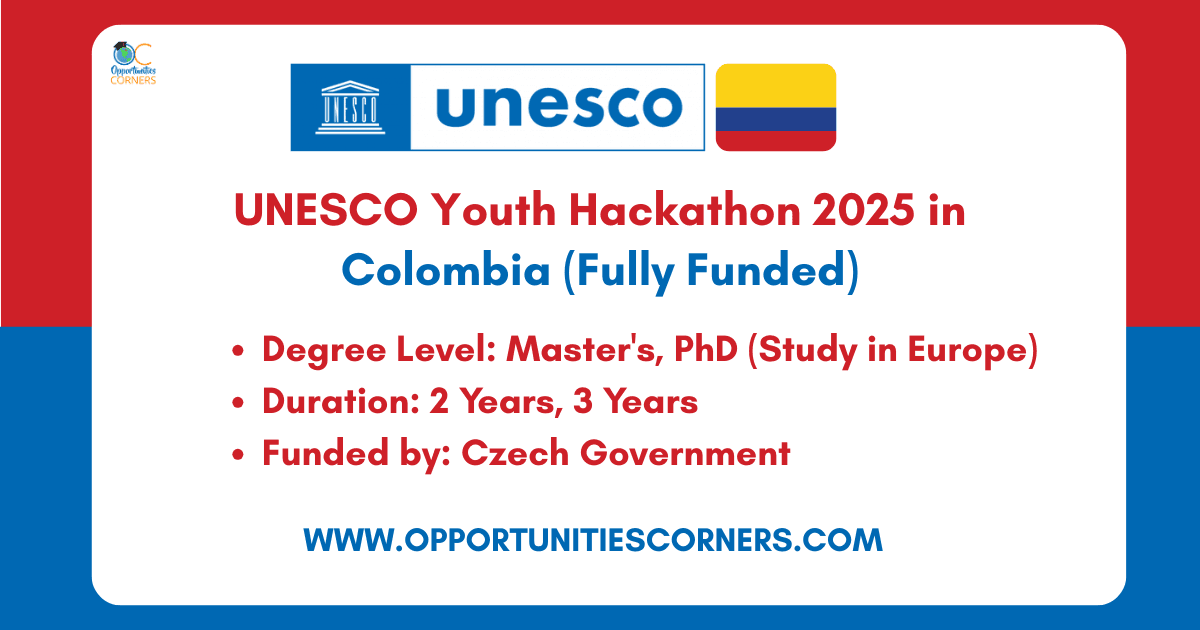UNESCO Youth Hackathon 2025 in Colombia (Fully Funded)

UNESCO Youth Hackathon 2025 to Address Digital Information Challenges in Colombia
Applications are now being accepted for the UNESCO Youth Hackathon 2025, a fully funded event scheduled to take place in Cartagena, Colombia, from October 23-24, 2025. The hackathon will gather young innovators from across the globe to collaborate on solutions to critical issues in the digital information landscape, including the proliferation of misinformation, online hate speech, the dominance of online platforms, and threats to information integrity. The event is a key component of UNESCO’s Global Media and Information Literacy (MIL) Week.
Focus on AI and Information Integrity
The 2025 hackathon builds upon the success of the 2024 event held in Indonesia, which hosted 202 teams. Winning teams from the 2025 hackathon will have the opportunity to present their projects at the Global MIL Week Conference in Cartagena, with UNESCO covering all travel and accommodation expenses.
The hackathon's theme, "Youth Leading the Way: Building MIL Solutions for Impact," underscores the importance of youth engagement in addressing these challenges. Participants are encouraged to develop innovative solutions in several key areas:
AI and MIL: Addressing challenges posed by AI through media and information literacy. MIL Education: Creative approaches to MIL learning in the digital age. Community Impact: MIL-based interventions that empower communities. Youth Engagement: Strategies to position youth organizations as MIL change agents. Open Track: Other MIL-related ideas aligned with the year’s theme.
Diverse Project Categories Encouraged
Project proposals can encompass a wide array of formats, including games, applications/websites, radio programs/podcasts, artistic works (comics, short videos, documentaries), educational toolkits, youth organization campaigns, community-based interventions, and other creative modalities.
Expert Perspective: The Importance of MIL in a Digital Age
Dr. Anya Petrova, a leading researcher in media literacy at the Institute for Digital Futures, emphasizes the critical role of initiatives like the UNESCO Youth Hackathon. "In an era defined by information overload and sophisticated disinformation campaigns, media and information literacy is no longer a luxury but a necessity," Dr. Petrova states. "Empowering young people with the skills to critically evaluate information, understand algorithms, and identify biases is essential for building a more resilient and informed society. The UNESCO hackathon provides a valuable platform for fostering innovation and collaboration in this crucial area."
Eligibility and Application Details
The UNESCO Youth Hackathon 2025 is open to candidates from all countries. Teams must consist of 3 to 6 members, with all members aged between 18 and 30 years old. Gender balance and inclusivity within teams are strongly encouraged. No prior experience is required, with passion and motivation being the primary criteria for selection.
The deadline for applications is September 1st, 2025. Interested applicants must submit an online application through the UNESCO website.
Historical Context: The Evolution of Media Literacy
The focus on media and information literacy has evolved significantly over time. Initially, media literacy efforts were primarily concerned with analyzing the content of traditional media, such as newspapers and television. However, with the rise of the internet and social media, the scope of MIL has expanded to encompass a broader range of skills, including the ability to critically evaluate online sources, identify misinformation, understand algorithms, and navigate the complexities of the digital information ecosystem. UNESCO has been at the forefront of promoting MIL globally, recognizing its importance for fostering democratic participation, promoting social inclusion, and combating extremism.
Current Challenges and Future Directions
The rise of artificial intelligence presents both opportunities and challenges for media and information literacy. AI-powered tools can be used to create and disseminate misinformation more rapidly and effectively, making it increasingly difficult for individuals to distinguish between credible and unreliable sources. At the same time, AI can also be used to develop innovative tools for detecting and countering disinformation. The UNESCO Youth Hackathon 2025 provides a vital opportunity to explore these challenges and develop creative solutions that leverage the power of youth innovation.
Financial Benefits
The UNESCO Global Youth Hackathon is a flagship initiative of UNESCO’s Global Media and Information Literacy (MIL) Week. The program covers:
Round Airfare Tickets Accommodation
Program Structure Selected Participants will receive free online mentoring before submitting their idea. Applicants will submit projects and Proposals via the UNESCO Website. Winning Teams will be invited to Colombia to present their Projects at the Global MIL Week Conference.
Second Expert Perspective: Fostering Critical Thinking According to Professor David Miller, a professor of education at Columbia University, "This Hackathon is more than just a competition; it's a crucial step in fostering critical thinking skills among young people. By engaging in collaborative problem-solving and developing innovative solutions, participants will not only contribute to addressing pressing global challenges but also cultivate essential skills for success in the 21st century."
Originally sourced from: Opportunities Corners
